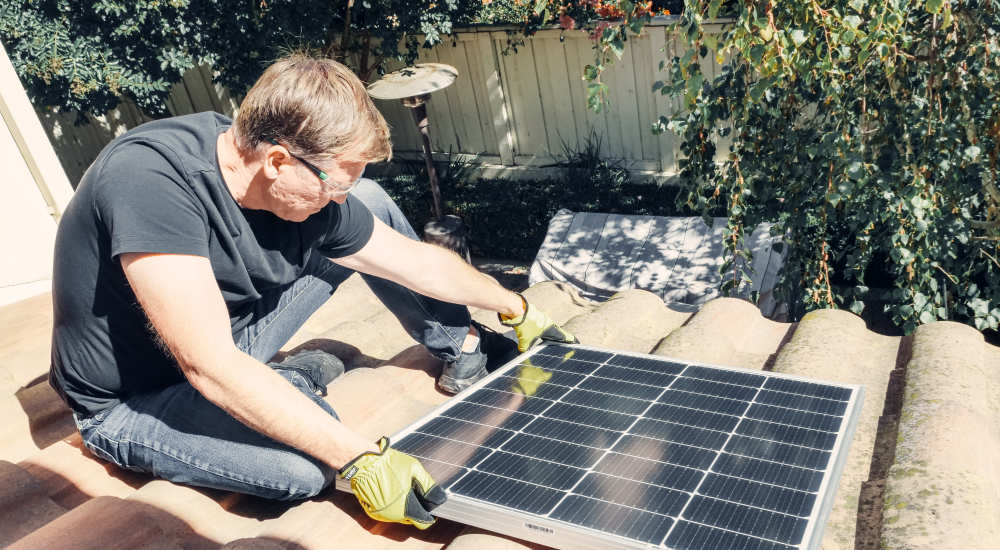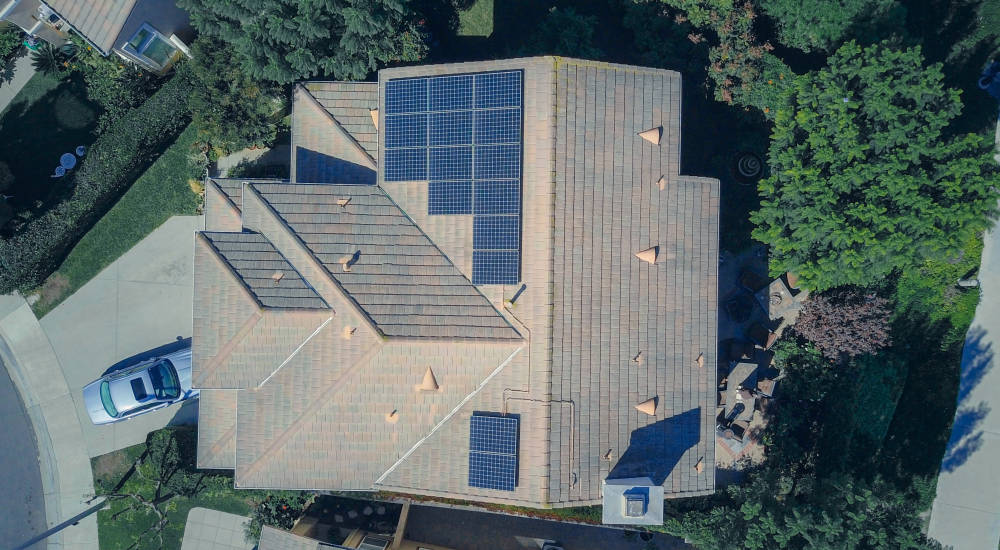Solar Panels For Home: Are Solar Panels Worth It In Canada?
In 2010, the entire country of Canada installed 221 MW worth of solar panels. Just over 10 years later, by the end of February 2022, the country installed 3,325 MW. The largest contributor to Canada’s solar power generation is Ontario; it shares 96% of its solar power with the rest of the country.
Though Canada is known for harsh winters and mild summers, the advancements in solar power technology have made it possible for solar energy to be harnessed in abundant amounts. To incentivize more Canadians to invest in solar power, the government offers rebates and tax breaks on a national level, and many provinces offer provincial benefits as well.
Since the idea of solar power is new to many people, we’ll break down the nitty-gritty of installing solar panels in your home in Canada. Assessing cost, installation requirements, panel needs, and more will provide you with the knowledge to get the best solar panels in Ontario – or anywhere else in Canada – has to offer.
Before that, you might be interested in How Do Solar Panels Work for Your Home.
Table of Contents:
- Assessing Your Home’s Solar Needs
- Weighing Your Options: 3 Types of Solar Panels
- Investment Required to install solar panels for homes
- Is the Investment Worth It?
- Government Schemes for Solar Panels in Canada
- The Beauty of Net Metering
- Net Metering Mitigates Energy Crisis
- Solar Power is Here to Stay
- Buy the Best Solar Panel for Home Use
Assessing Your Home’s Solar Needs
When you think of normal electricity, it’s pretty common knowledge that a giant home will require a lot more energy to run than a small cottage. Installing solar panels is similar; depending on the size of your home, your current energy demands, and other factors, you might need a different panel configuration than your neighbor would need. Get this – the tilt of your roof will also play a part in determining how many solar panels you need!

Figuring out how many solar panels you need all starts with assessing your current energy usage. The Ontario Energy Board estimates that average Canadian households use roughly 9,000 kWh of electricity per year. The average household, therefore, would need a system of approximately 7,500 watts.
So how big of a solar panel do you need to power a house? A small system generates 6,000 watts of electricity, a medium system offers 10,000 watts, and a large system can generate up to 18,000 watts per year. If the solar panels you purchase generate 400 watts each, you would need anywhere from 18-23 panels for an average home in Canada. Of course, if you have unique requirements and need an even larger system, discuss your options with solar panel providers in Canada, or you can make good use of a solar powered calculator.
Weighing Your Options: 3 Types of Solar Panels
Not all solar panels are created equally. With advancements in technology, there are many options available on the market today that were not around even a decade ago. The three main types of solar panels are monocrystalline solar panels, polycrystalline solar panels, and amorphous silicon solar panels.
Monocrystalline Panels
Usually the most expensive option, monocrystalline panels offer extensive benefits that match the price point. These are the most common type of solar panels, as well as the most efficient. They are great at producing electricity, can handle hot temperatures, and last a long time. They also take up a bit less space, which can be a major benefit to some homeowners.
Polycrystalline Panels
Though cheaper than monocrystalline panels, polycrystalline panels are still very efficient. They don’t generate quite as much power and tend to wear out faster, but if you’re looking to install solar panels at a more moderate price, these are a great option.
Amorphous Silicon Panels
The lightest and most flexible option, amorphous silicon panels excel in high temps and are great for low-light regions. However, they take up more than twice the amount of space and produce the same amount of energy as the options above. They don’t last as long either.
The right solar panels for your home will depend on many different factors, but the solar company you work with should be able to answer all your questions, assess your needs, and set you up with the right solar solution. If you need all-in-one solution, look no further than Renogy.
Investment Required to install solar panels for homes
Making the change to solar energy requires an upfront investment. The cost will fluctuate depending on where you live and what your energy needs are. For instance, if you’re installing solar panels, Ontario averages $2.46 per watt. In the above example, a household that needs 9,000 watts could expect to pay $22,140. On the other hand, a household in Nunavut, where the price is more than $4.00 per watt, should budget for a $36,000 investment.
Is the Investment Worth It?
Investing in solar panels can come with a large price tag, and you’re not alone if you’re questioning whether the investment will actually pay off. To be realistic, it’ll take a few years before you recoup your initial investment. However, those pesky monthly energy bills that always seem unpredictably high? You won’t have to deal with those anymore.
In a study conducted by the Canada Energy Regulator, from the years 2013-2017, the average annual energy cost was about $4,281. If you install solar panels for just over $22,000, then after 6 years or so, your investment will pay itself off.
Government Schemes for Solar Panels in Canada
Additionally, many governments around the world, including in Canada, offer financial incentives to homeowners that install solar panels. Through the Canada Greener Homes Initiative, you could be eligible for a grant of up to $5,000 to help pay off your solar installation. There is also a tax credit offered on a federal level that is worth 30% of what it costs you to switch to solar. After 2032, that credit will drop to 26% of the total cost, so move quickly!
Provinces will also support the installation of solar panels; Ontario, for instance, is a great place to install solar panels, and there could be many provincial or local benefits offered. Be sure to look into federal benefits, provincial benefits, and local benefits available to you before you start the installation process.
Spot more eligible incentives in Canada here.
The Beauty of Net Metering
Even if you aren’t eligible for any federal, provincial, or local financial benefits, net metering is a massive benefit of installing solar panels that many people don’t fully understand. Net metering is basically an agreement you make with your current utility company, allowing them to connect your solar energy system to the power grid in your area. If your solar panels generate more energy than you can use – which is more common than you think – then that excess energy goes back to the power grid, where it can be used by other households.

The major benefit for you is that these agreements attach a price to each watt of energy you supply to your local or provincial power grid. Then, your utility company will credit your monthly electricity bill, reducing the amount you’ll pay overall. It is worth noting that the monetary amount that you get credited can only be applied to your utility bill; there is no way to “cash out.”
During the sunny summer, your solar panels will have more time and sunlight to soak up energy from the sun, and you’ll likely have plenty of excess energy to give back to the power grid. Then, in the winter, when the days are darker and your solar panels don’t have as much sunlight to pull from, you might need to pay for electricity from your utility company. But wait! You would have credits from the summer to apply to your winter bills, reducing your monthly expenses.
Net Metering Mitigates Energy Crisis
With record temperatures in the winter and summer, power grids all over North America get stretched thin. In the summer, California struggles with rolling blackouts due to high heat. In the winter, the Texas power grid collapsed due to surprisingly chilly temperatures. In Canada, where temps can change drastically from season to season, net metering can help protect power grids from failure.
When there is excess power to pull from, such as when your solar panels produce more energy than you need, then utility companies can use that energy to mitigate grid failure. If power grids do fail, it often causes major issues and can even endanger lives. So, if you weren’t convinced by the financial benefits of solar, maybe the good that solar panels can offer will be a nudge in the right direction.
Solar Power is Here to Stay
It’s no secret that solar energy is much easier on the planet, offering an abundant source of renewable energy. But now, it’s also much more accessible than it used to be. You can have solar panels installed within a matter of weeks and begin enjoying the benefits ASAP. There’s nothing like getting a monthly utility bill that is $0 or even offers a credit, but with solar panels, that can become a regular occurrence.
For now, governments offer respectable financial incentives, but as solar energy becomes more mainstream, those benefits might fade away. Staying on the upward swing of this trend will be rich with benefits. Though an upfront cost is required, installing solar panels will pay for itself in a number of years AND offer intangible benefits to your community and the planet for decades to come.
Buy the Best Solar Panel for Home Use
Renogy has a range of off grid solar panels and accessories for sale, all with competitive pricing tags. For example, 12V batteries for small to medium-sized solar power systems and 48V batteries for larger storage needs, pure sine wave inverters for the safest electricity conversion, solar generators for outdoor activities, and the best solar panel types such as monocrystalline panels, etc. Contact us right now for reliable and useful suggestions.
Related articles:
How To Make A Solar Panel In Canada And Abroad?
What Is An Inverter And How Does It Work In An RV?






